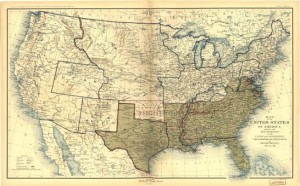 In the wake of the debilitating losses at Gettysburg and Vicksburg, the young Confederate nation, it’s existence almost entirely framed by war, is in its greatest crises to date. North Carolina Baptist Biblical Recorder editor J. D. Hufham reflects on the situation, today conveying his thoughts–and hopes–to his readers.
In the wake of the debilitating losses at Gettysburg and Vicksburg, the young Confederate nation, it’s existence almost entirely framed by war, is in its greatest crises to date. North Carolina Baptist Biblical Recorder editor J. D. Hufham reflects on the situation, today conveying his thoughts–and hopes–to his readers.
The condition of the country is still the topic on which the public attention is concentrated. All eagerly seek to learn what is the real situation of affairs and what signs of encouragement there are for us in the future. A brief glance at the theatre of war will show that this is the crisis of our national history, that we have reached a point which is full of peril to us and requires the greatest wisdom, fortitude and energy on the part both of our rulers and our people to meet its exigencies.
General Lee has recrossed the Potomac with his army, and that veteran host is once more on the soil of Virginia, from which the hordes of our enemy have so often been hurled back in ignominious defeat. Though the Yankees claim a victory for themselves in the battles at Gettysburg, the fact that they allowed Lee to return to Virginia without any serious effort to intercept him, shows that they suffered more heavily than we did in those conflicts. The people will breathe more freely now. The army of Virginia is once more on its own soil, near its base of supplies, able to choose its own ground, and to send reinforcements to other threatened points. Once more on this side of the Potomac, no one doubts the ability of General Lee to maintain his position.
At Charleston the struggle goes on, but the signs there are more hopeful. The efforts of the enemy to capture our works on Morris Island have been unsuccessful, and, meanwhile, we have attacked him there and on James’ island, and in both places have had the better of the fight. Reinforcements are being sent to Beauregard and we hope he will yet be able to hold intact the stronghold which he defends.
From Jackson we learn that Gen. Johnston, after defending the place as long as he could, and repulsing every attack of the enemy fell back to avoid being flanked on the right. Those who know him best feel confident that he will be able to hold Grant in check.
Bragg has fallen back to the line of the Tennessee river, and has thus checkmated Rosecrans. To advance now, he must strengthen his line of communications and leave his base of supplies far in his rear.–This will weaken his effective force and expose him to annoyance from our cavalry.
The States west of the Mississippi are now left to take care of themselves, but they have been doing this for a long time.–The fall of Vicksburg and Port Hudson will not be a serious inconvenience to them.
The condition of affairs, while it is perilous, is also hopeful. Let us but do our duty in this emergency, looking to God who decides the fate of of nations and all will be well. We need reinforcements for our armies. Our late disasters are attributable, in a great measure, to the numerical superiority of the enemy. He has called for 300,000 more men, and though the effort to secure them has been resisted, it is probable that he will get them. It is clear, then, that if the struggle is to go on, the strength of our armies must be increased. President Davis has called for more men, and we believe that the country which has heretofore so cheerfully met every demand, will respond to this last call. Let each one do his duty now, looking, in humble confidence, to God and He will sooner or later bring to nought the plans of our enemies and give us what we all so much desire, an honorable and permanent peace.
The numerical military advantage of the United States over the Confederacy will only grow for the remainder of the war, proving to be critical to the conflict’s outcome.
Source: “The Duties of the Hour,” Biblical Recorder, July 22, 1863 (link)


